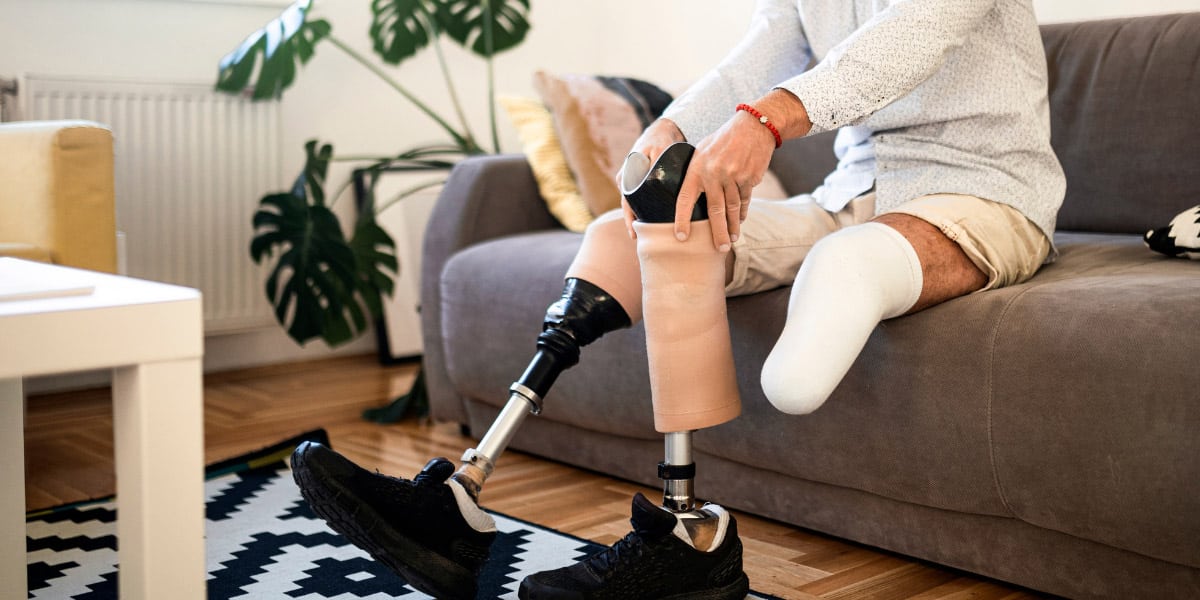Blog Category: SDA
The Separation of NDIS housing and disability supports
Published - 10/27/2023
Author - Enliven Housing

Independence plays a crucial role in people’s lives, and everyone deserves to feel safe and have the freedom to make their own choices. This blog focuses on individuals with disability and their pursuit of a more inclusive and independent living environment. The National Disability Insurance Agency (NDIA) is actively working to take down barriers and empower people with disability to make their own choices about their living situations.
The NDIA follows an important principle: keeping NDIS housing and disability supports separate. This separation will give participants more freedom and control. This will enable them to change their support or accommodation provider without having to change both.
Quick links:
Disability supports funded under the NDIS home and living options
If you qualify for the NDIS, you could seek funding for NDIS home and living supports as part of your NDIS Plan. It has a range of services designed to assist you with daily activities. This funding can cover a variety of supports specific to your needs, such as:
- Assistance with daily life support (from Core supports budget)
- Home Modifications
- Individualised Living Option
- Supported Independent Living
- Short Term Accommodation
- Medium Term Accommodation
- Assistive Technology
- Specialist Disability Accommodation
- Living in and moving out of residential aged care
If you are an NDIS participant, it’s important to understand the financial responsibilities that come with day-to-day living. This includes covering costs like groceries, utilities and telephone or internet expenses. Similarly, general household items such as beds, fridges, and cooking utensils are also your responsibility.
However, it’s worth noting that there are certain situations where the NDIS might offer some assistance with these costs. While most participants will handle these expenses independently, the NDIS could potentially provide contributions under specific circumstances.
If you want more information or you’re looking to apply for home and living supports using your NDIS Plan, all you need to do is fill out the Supporting Evidence form.
The limitations of SIL
Before the NDIS came into effect, NDIS housing and disability supports services used to be bundled together, limiting the choices available for participants in where they wanted to live and the types of support they could receive. This setup wasn’t adaptable and frequently resulted in less-than-ideal situations for individuals with disability.
The idea of SIL (Supported Independent Living) existed before the creation of the NDIA, and it has changed and evolved over the years. SIL is primarily meant for individuals with high support needs. In this setup, people receive funding that matches their specific needs, which often involves living with others who have similar needs. This arrangement allows everyone in the household to share and benefit from the provided support together.
Living in a SIL home has its advantages:
- Availability of 24/7 support
- Social interaction with other participants
- Cutting down expenses by sharing with others, such as reducing costs related to rent and electricity
However, in this setup, the SIL provider often serves as both the support provider and the landlord of the home, which can cause some issues for the tenant. For example, you have limited options for switching to a different support provider if you’re not happy with their services. To switch support providers, you would typically need to relocate from the SIL house. If you find yourself in this situation, it can become very challenging.
Another issue that you may encounter when living in an SIL home is the inflexibility of the NDIS ROC (Roster of Care). ROC is all about planning, scheduling and managing support worker shifts and tasks to provide you and your housemates with support.
However, the determination of the ROC is often dictated by the support provider and sometimes without the involvement of the tenant. This means that your choice and control are limited as the support you get may not always match your goal or your preferred time to receive the support. Also, your approved ratio of support is influenced by the supporting evidence submitted to the NDIA by the provider.
Though there are advantages to living in a SIL home, you also need to be aware of the disadvantages when your NDIS housing and disability support are bundled together.
Understanding the separation of NDIS housing and disability supports
Separation of housing and supports is critical to the fundamental NDIS premise of choice and control to ensure you are in control of where you want to live and how you want to receive your supports.
The NDIA assesses and provides funding separately for two things: Your NDIS housing which is the Specialist Disability Accommodation (SDA) and disability supports funding.
What is SDA?
SDA, which stands for Specialist Disability Accommodation, is all about housing designed especially for individuals who have significant functional impairments or require extensive support. These brick-and-mortar homes come with unique and accessible features, and they can even be equipped with Assistive Technology (AT) to improve independent living.
SDA is intended for individuals who have SDA funding included in their NDIS plans. This funding is allocated directly to SDA providers, like Enliven Housing, to cover the costs related to construction and upkeep. Participants are responsible for paying reasonable rent and handling everyday expenses such as electricity bills.
SDA housing has five distinct SDA design categories which are Basic, Improved Liveability, Fully Accessible, High Physical Support, and Robust.
To qualify for SDA, you need to have a substantial functional impairment or require intensive support. You must also meet the specific SDA requirements and the funding criteria outlined by the NDIS.
For more information about SDA and eligibility, check out our SDA Housing-Your Complete Guide.
What is NDIS disability supports?
Your NDIS disability supports includes help with daily living and other assistance to help you live independently.
Assistance with daily living
Assistance with daily living falls within the NDIS Core supports category. This NDIS support budget is designed to flexibly offer the help you need in your everyday personal activities, so you can live a more independent life.
Every person with a disability has support needs unique to them, so your daily support will be personalised to suit your specific needs. With this, everyone can access the assistance necessary for a more independent life.
Your NDIS Plan can provide different forms of support to meet your needs:
- Daily Personal Activities: These supports provide you with assistance or supervision with your personal daily activities.
- Assistance with Personal Domestic Activities: Assistance with chores and tasks at home.
- Short-Term Accommodation: Access temporary assistance and accommodation when needed.
- Home and Community Support: Explore additional support options within your home and community.
Onsite share support
This support item will help you when you live in an SDA-certified home with established onsite support arrangements.
The onsite shared support offers round-the-clock assistance for unexpected needs that aren’t part of your usual daily routine. It covers on-the-spot help for you when you require unplanned support within your SDA home. Generally, this support shouldn’t exceed 2.5 hours of drop-in one-on-one assistance per day. Participants should be prepared to wait for up to 1 hour for unplanned help.
Benefits of the Separation of NDIS Housing and Disability Support
1. Choice and Control
The NDIS makes it easier for you to have more control over where you want to live and the supports you get, without them being tied together. This means you can pick a place to live that works for you, whether it’s because it’s closer to your family or it’s your preferred suburb. Plus, you can also choose support providers who offer the services that are perfect for your needs. This gives you more say in your life and helps you get the best results.
2. Flexibility
Keeping NDIS housing and disability supports separate gives you the freedom to make necessary changes without getting stuck with a particular housing choice or support provider. Your needs or personal goals change over time, so with the separation, you have the flexibility to adjust the support services to match your evolving needs and goals without any issues.
3. Accountability
A clear separation of responsibilities between the NDIS housing and disability supports providers holds them more accountable. This separation also enhances focus and transparency in service delivery. Accountability and transparency protect you from potential exploitation.
The Enliven Housing approach
Living at an Enliven Housing apartment means you don’t need to stress about your ratio of support or your ROC. The apartment is yours, and you get to decide who visits or lives with you. Together, we co-design your support plan, so you can choose when and what kind of support you want.
Our goal is to give you as much choice and control over your life as possible. We take our responsibility to be an active safeguard for our tenants and do our part in keeping them safe from the risk of abuse and neglect.
Enliven Housing is Australia’s most trusted SDA housing provider. We specialise in constructing apartments that meet the highest SDA standards. It’s important to note that we provide SDA housing exclusively and don’t provide personal support.
Community Cooperative
Our approach at Enliven Housing involves tenants becoming part of a Community Cooperative. This Cooperative collaborates closely with an OSP (Onsite Support Provider). It’s important to understand that the OSP operates independently and is managed by separate organisations.
Being part of the Community Cooperative offers several benefits that can make your life easier:
- Choice of support worker – You’ll have the opportunity to provide feedback to influence your choice of support worker. You as a collective can choose the best worker to suit the needs of the group.
- Cost-effective – Sharing support with others can help you get more value from your NDIS funding.
- Emergency support available – In case of an emergency, a support worker is nearby to help.
- Affordable overnight support – You can enjoy cost-effective overnight support and have peace of mind knowing someone is there to assist you.
When you join the Community Cooperative, you and the other tenants will work together to shape the cooperative based on your interests, needs, and desires.
For more information, visit our Community Cooperative page.
Hopefully, this guide has been helpful to you. But if you’re still unsure about the separation of NDIS housing and disability supports, you can call us at 1300 ENLIVEN and have a conversation with one of our SDA specialists.

Speak to our team
Related Blog Posts
How are SDA Apartments different from other disability housing?
This guide will help you understand the differences between SDA apartments and other types of disability housing.
Things to think about before moving to disability housing
We understand that moving can be overwhelming, so here are some practical tips to turn your dream of independent living into a reality.


